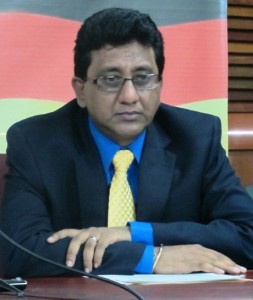
Guyana has been formally blacklisted by the Caribbean Financial Action Task Force (CFATF) as a result of the non-passage of the Anti-Money Laundering and Countering the Financing of Terrorism (Amendment) Bill, Attorney General Anil Nandlall and Legal Affairs Minister has said.
Nandlall is attending a critical meeting of CFATF taking place in Freeport, The Bahamas. Prior to his departure for the meeting, Nandlall had observed that in May during the Nicaragua meeting, the country had been granted a six-month extension to pass the bill. “Not in my wildest imagination did I predict that the opposition would have behaved the way that they have done,” he said.
Nandlall had to report to a group of approximately 40 persons representing the interest of 26 countries.
He had noted that he had no sensible reason to put forward as to why the bill was rejected by the parliamentary opposition.
The attorney general said the reasons put forward by the Alliance For Change (AFC) and the A Partnership for National Unity (APNU) would be reflected in the parliamentary proceedings and meetings which would be presented to CFATF.
The AFC’s call for a procurement commission should not have been linked to the AMLCFT Bill, while the APNU’s call for the return of the bill to the select committee would see minutes reflecting that the bill had already been there.
Dire consequences

Nandlall expressed interest in the reaction of Guyanese when the consequences of the resultant sanctions would have to be borne by all persons, irrespective of their position on the social and economic ladder. “Guyana is now left at the mercy of the discretion of the CFATF,” the attorney general said bluntly.
He noted that the opposition has put Guyana’s future in that position, as “it is out of my hands”.
Nandlall reminded that the draft report that has already been prepared declares Guyana non-compliant, and countries have been invited to adopt counter measures to protect themselves from the risks of money laundering and financing terrorism emanating from Guyana.
The recommendations from CFATF are in two sections: legislative (the bill) and non- legislative (the Financial Intelligence Unit (FIU), and Special Organised Crime Unit (SOCU)), he pointed out.
The legal affairs minister added that while CFATF was already aware of this; the bill would allow the agencies to exercise their mandate. He said government was trying to put in place some of the recommendations contained in the bill, through mechanisms that will not require parliamentary intervention or will minimise it, “since the National Assembly has become a hazardous place”.
Earlier this month, the combined opposition blocked the passage of the anti-money laundering bill in the National Assembly after a period of deadlock and lack of compromise with respect to the process, which was used to move the bill from the special select committee, to the full House.
The two opposition political parties withheld their support for the legislation for the second time after they voted first to send it to a special select committee, some six months ago, despite threats of serious sanctions.

Guyana had been given a November 18 deadline by CFATF to make amendments to the existing legislation, which was non-compliant with the sweeping reforms taking place regionally and internationally to fight money laundering and terrorism.
However, despite the serious political risks associated with offering non-support for the legislation, the APNU and the AFC made a decision not to support the legislation. The nonsupport of the bill had come even after Western powers urged that it be passed.
During an exclusive interview with Guyana Times International, U. S. Ambassador D Brent Hardt and his UK counterpart, Andrew Ayre had urged the opposition parties to put forward their proposed changes to the bill.
The diplomats underscored the importance of the legislation, noting that it will guarantee Guyana’s financial stability. They said approximately two years after the general election, it was clear that “compromise” was the way forward. “… In fact, there is no other country that I have worked in that has a minority government that has been able to put forward its policies without, on occasion, compromising with the opposition.”
The ambassadors said the interest of the people should be placed on top of the agenda. “We have, indeed, approached all political parties for discussion on this topic – a topic which is very important for the future of Guyana’s financial stability. It remains the topic of the highest importance to us all.”



